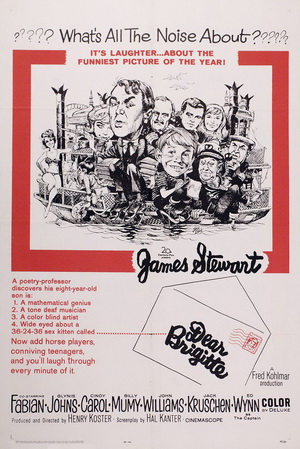
DEAR BRIGITTE
US, 1965, 100 minutes, Colour.
James Stewart, Glynnis Johns, Fabian, Cindy Carroll, Bill Mumy, John Williams.
Directed by Henry Koster.
Mr Hobbes Takes a Vacation is the first of three films that James Stewart made with director Henry Koster in the early sixties. Stewart had worked with Koster in the fifties with the comedy Harvey and the adaptation of Nevil Shute's No Highway in the Sky. The other two films in this trilogy are Take Her, She's Mine and Dear Brigitte.
The first two films were written by prolific screen writer-producer Nunnally Johnson. Each of the three films is popular family Americana of the early sixties - humorous, sentimental, affluent, brash and slightly superficial. Mr Hobbs is the most entertaining of the three and teams Stewart with Maureen O’ Hara. Take Her, She's Mine is the slightest and involves Stewart in an examination of the popular behaviour patterns with young teenagers in the early sixties. In Dear Brigitte the family is younger and Bill Mumy, a popular television youngster who later grew into an actor in such films as Bless the Beasts and Children and Sunshine, involves a youngster infatuated with Brigitte Bardot to whom he writes and the film ends with a visit to the famous actress. This time Glynnis Johns is the wife.
1. The popularity of this film as an American family comedy? The ‘folksy’ and homespun aspects of this kind of comedy? The appeal for American audiences? The appeal for overseas audiences?
2. The quality of the humour, sentiment? The traditional values of family and career that are presented? This film is a product of America in the early Sixties. Is the film dated?
3. The reliance on colour, Cinemascope, the styles of the stars, the impression of Brigitte Bardot, music etc?
4. The humour and appeal of having Brigitte Bardot as the focus for the film? Bringing her in in person at the end? Did audience share Erasmus's desire to see her? Brigitte Bardot and her sex appeal to the average American as embodied in the young boy, Erasmus?
5. The success of the characterization of the Captain and his humour, his talking to the audience, his comments? Were they helpful? A useful device for this kind of comedy, to interest the audience?
6. The film's presentation of the family as a typical kind of family? Yet eccentric? The houseboat, James Stewart and his style, his children, the nice English wife? The pleasant aspects of the family? The weaknesses of the family? Their belief in wholesome traditional American values?
7. How important for the film was the discussion about arts and science? The academic overtones and the quality of life? The satire on both? The message about how to live life humanely?
8. The satire in the practical and impractical overtones of both approaches?
9. How enjoyable was the characterization of Erasmus? His participation in the family music and his being off key? His colour blindness? The blow that his genius was in mathematics? His own boredom at his celebrity? His wanting to gain money, especially to post his letters? The humour in the joyful writing of letters to Brigitte Bardot?
10. The humour of the scenes where Erasmus’s mathematical genius is presented? Good comedy? The satire in the reaction of his father ashamed that he was not a genius in arts? The support of his mother? Being exploited by companies and TV stations? His sister wanting the money, her boyfriend and the betting?
11. The humour as well as the satire in Professor Upjohn and his approach to the professor? Catching him with his poetry? The cover of the Foundation? Argyle and the betting? The humour of presenting the betting as if it were a very noble kind of thing?
12. The importance of the visit to Brigitte Bardot? What it meant to Erasmus? To the professor? Upjohn’s devious way of letting them go on the visit? Brigitte Bardot’s personality, her niceness to Erasmus and to the professor, the gifts? The humour in the taxi driver who did not see her?
13. The humorous build-up to the climax, a fairytale blown, but the money gained and the Foundation still lasting? Professor Upjohn joining the family at music?
14. Why does this kind of nice comedy and nice humour appeal to most audiences? Is this a good thing?